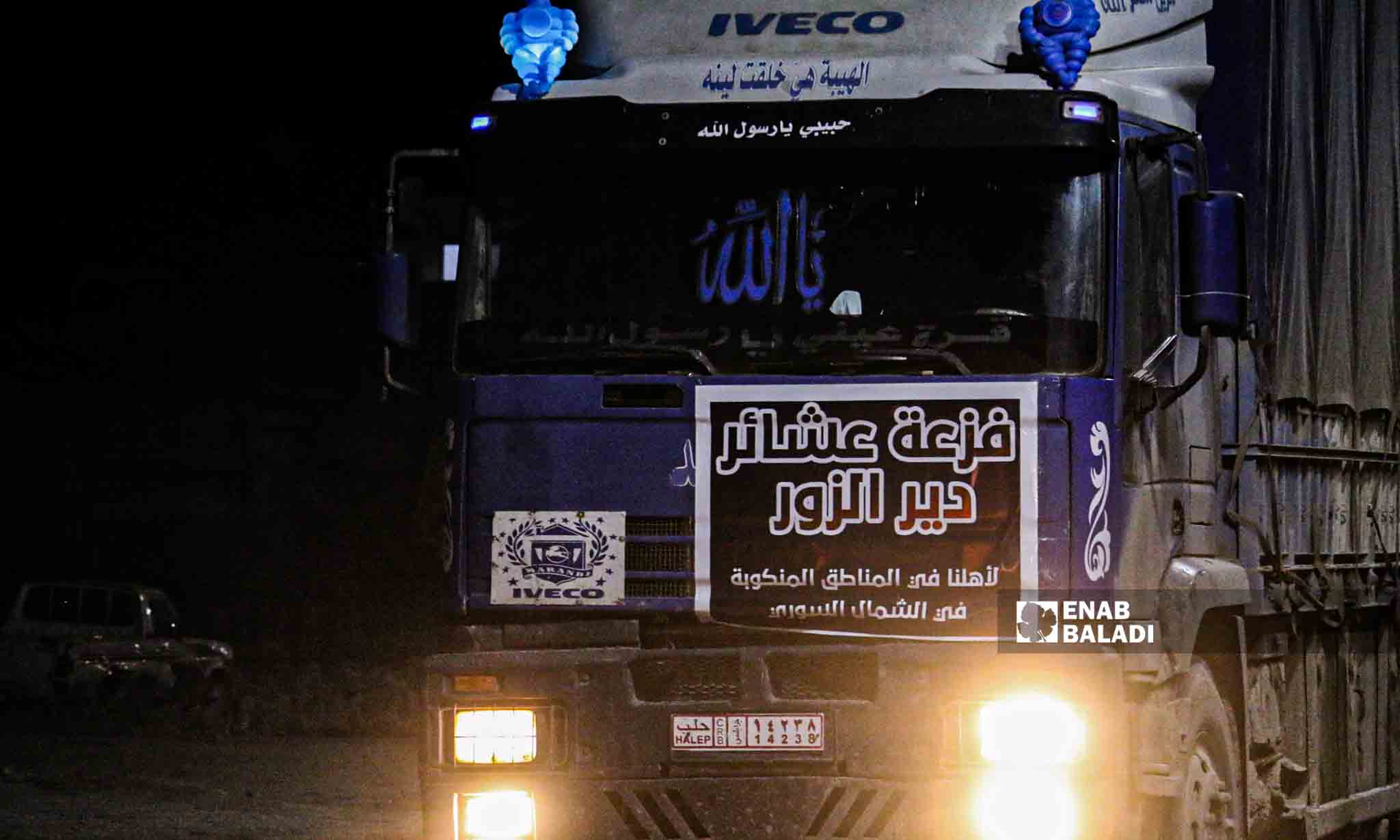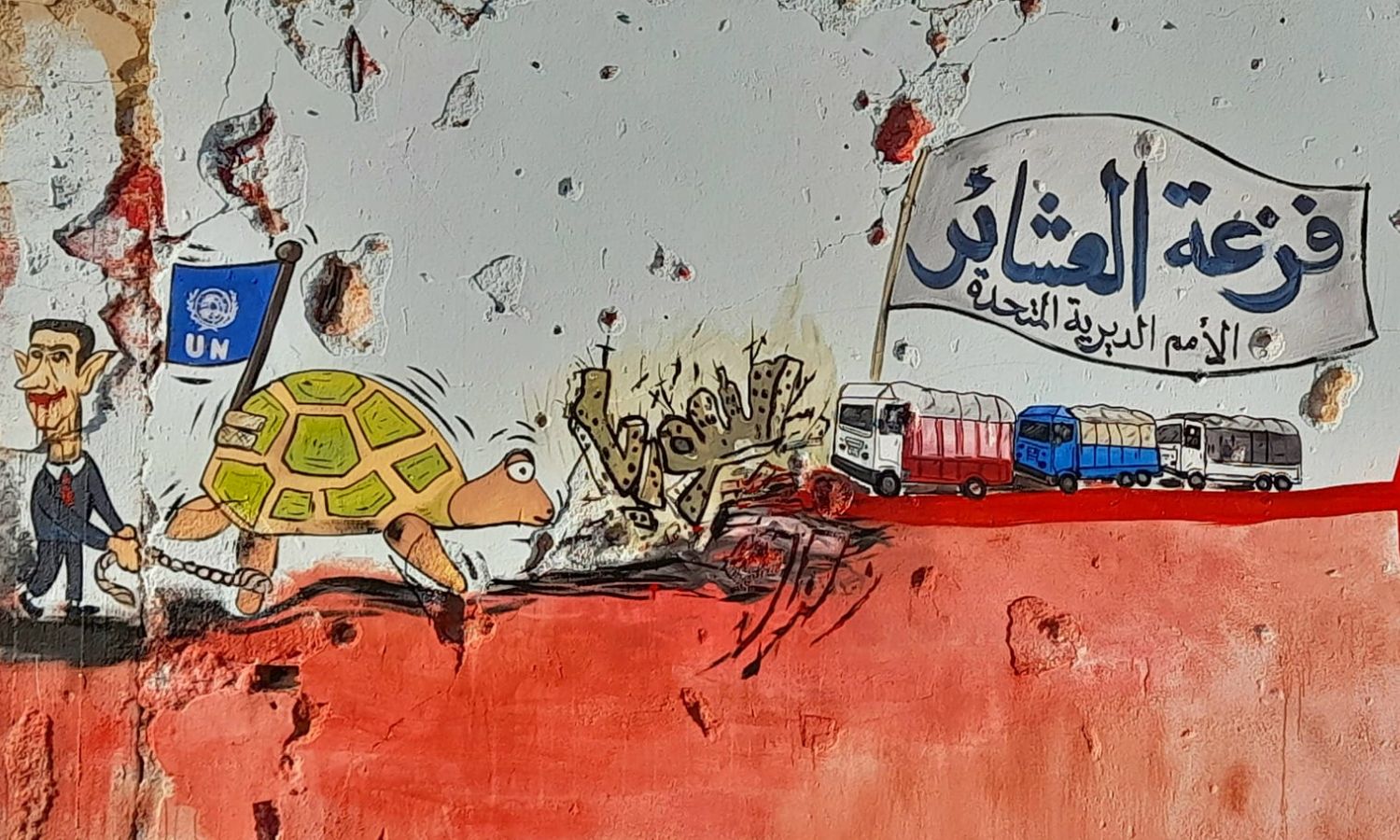



Dozens of trucks loaded with aid and relief materials provided by Arab tribes of the eastern regions headed towards the opposition-held northwestern areas on the seventh day of the earthquake that hit Turkey and Syria, leaving more than 45,000 dead.
The convoy was the first of its kind to enter from the areas controlled by the Syrian Democratic Forces (SDF), the military wing of the Autonomous Administration of North and East Syria (AANES) since its formation, to the areas controlled by the opposition, and it was like popular solidarity among the people of the clans for the afflicted in northern Syria, as the death toll of the earthquake in northwestern Syria topped 2274 along with 12,400 injuries, in a toll that is expected to rise as rescue operation continues for victims under the rubble.

A mural in northern Syria of a relief convoy from Deir Ezzor tribes for the affected people by the earthquake in northwestern Syria, by artists Aziz Asmar and Anis Hamdoun – February 14, 2023 (Facebook/Aziz Asmar)
On February 13, seven days after the earthquake, about 120 vehicles and trucks loaded with aid entered through the Own al-Dadat crossing separating the areas controlled by the SDF and the Syrian Interim Government (SIG) in the countryside of Aleppo.
A member of the local council in the city of Jarablus in the countryside of Aleppo, Hussein al-Hamoud, told Enab Baladi that coordination for the clan convoy began after the earthquake occurred at the level of the tribal and clan council in the eastern region and in the north, and was reinforced by the kinship ties between the tribes.
Al-Hamoud added that the trucks were formed from the donations of the people as much as they could of clothes, mattresses, blankets, sums of money and foodstuffs, and medical equipment and other necessities were purchased.
The first batch included 83 trucks, and coordination was made with institutions, councils, and military authorities in the north to receive it.
The responsible authorities on both sides of the crossing refused to let the same trucks enter, and they were transferred to other trucks. The transfer process lasted three days, after which a second batch of 22 trucks entered.
Al-Hamoud, who is also a member of the Civil Peace Council, stated that the vehicles were accompanied by military personnel to ensure their arrival to the affected people in the stricken areas in the countryside of Aleppo and the areas of Idlib, and a delegation of clansmen and workers in the relief, humanitarian and medical fields entered with them.
Ahmed al-Aboud, commander in the Syrian National Army (SNA), who accompanied the convoy from the Own al-Dadat crossing, explained to Enab Baladi that the National Army members secured the passage of the convoy and escorted it to the affected places.
The leader pointed out that the aid includes all the Syrians affected by the earthquake, whether they are Arabs, Kurds, or other members of society.
The number of large trucks and vehicles reached approximately 120, the first batch was transferred from cars to large trucks, and the second batch ranged between 22 and 25 trucks.
The commander, who hails from al-Tayyana town in Deir Ezzor, said that the convoy broke all restrictions and confirmed the cohesion of the Syrians and the members of the clans, pointing out that the Tribal Council, the Syrian National Army, and many parties facilitated the entry of the convoy.
Al-Aboud stated that the clansmen are preparing more trucks loaded with aid to be sent to the stricken areas in northern Syria in the coming days.
Enab Baladi’s correspondent said that the trucks were divided into two parts, the first in the town of Jindires in the countryside of Aleppo and the second in Idlib. Two local committees were formed in the two regions, in cooperation with the tribesmen, to distribute aid to the affected people.
The clans’ initiative received wide interaction on social media and comparisons between it and the United Nations aid to the earthquake victims in northern Syria, which was delayed four days after the earthquake occurred under the pretext of logistical obstacles.
The clan convoy was formed from the calls of the sheikhs and notables of the clans and civil society organizations, and it was through campaigns that bore several names:
– The “Fazaat al-Furat” campaign organized by the “Mary” organization.
– The campaign “Here is Syria (Hona Sorya)” was organized by the Coalition of Organizations in Northeastern Syria.
– The campaigns “The Clans” and “The People of the Euphrates” were organized by the clans of Deir Ezzor.
– The “Fazaat al-Raqqawiyah” campaign was organized by the civil charitable initiatives in Raqqa.
– Campaigns in the cities of al-Tabqa, Manbij, and all districts and villages in northeastern Syria.
The convoy bore the name “Fazaat al-Ashaer,” crossing the borders drawn by the military and political control, to be the first of its kind to cross the borders and internal crossings between the areas controlled by the Autonomous Administration supported by Washington and the areas controlled by the Syrian Interim Government supported by Ankara.
The AANES controls northeastern Syria, while the Interim Government controls the northern and eastern countryside of Aleppo and the cities of Tal Abyad and Ras al-Ain, and the Salvation Government controls the areas of Idlib and parts of the western countryside of Aleppo.
The AANES withdrew the aid convoy it sent to the earthquake-stricken people in northwestern Syria after nine days of waiting for approval to enter it through the Umm al-Juloud crossing, which connects it with the Interim Government’s areas of control.
The withdrawn convoy included 30 tanks of fuel and 20 trucks loaded with humanitarian and relief aid for those affected by the earthquake that struck southern Turkey and northern Syria.
The Autonomous Administration accuses Turkey of being responsible for preventing the convoy from entering the affected areas, in what it described as “linking this issue to political issues and positions at the expense of the victims and the affected.”
For its part, the Interim Government did not comment on not allowing aid from the Autonomous Administration to enter.
Enab Baladi contacted the official spokesman for the Syrian National Army, the military wing of the Interim Government, and the director of the Own al-Dadat crossing administration to obtain clarification about the closure of the crossings to aid, but it did not receive any response.
if you think the article contain wrong information or you have additional details Send Correction